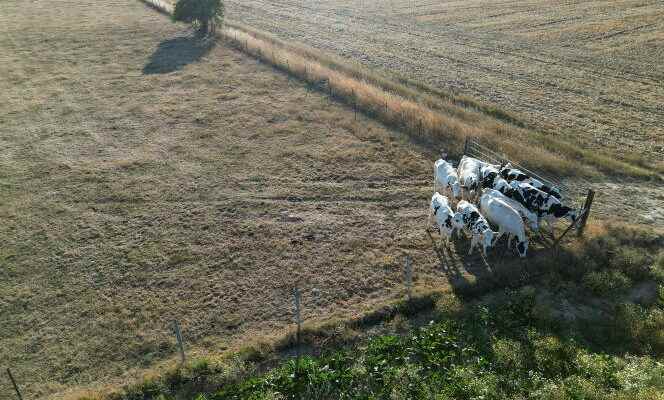This summer, the question of the price of milk has become hot again, at the very moment when the surges of mercury and the absence of rain were grilling the meadows. The breeders have raised their voices, demanding an increase in their remuneration and support to get through this episode of drought. The subject was, of course, at the heart of the discussions between the dairy industry and the Minister of Agriculture, Marc Fesneau, on the occasion of Space, the International Livestock Show, which was held in Rennes from September 13 to 15.
“With the increase in costs and the risk of having to buy fodder for the winter, breeders have cash flow concerns. The Minister has announced an exemption from property tax on undeveloped properties, for those located in areas declared to be in calamity”, explains Thierry Roquefeuil, president of the National Federation of Milk Producers (FNPL). The access and compensation thresholds for the agricultural calamities scheme are also negotiated. An assessment of losses is underway in the regions. As of August 20, the Ministry of Agriculture estimated that grass growth was one-third lower than normal across the country. Since then, the rain has greened the countryside in Brittany, the Jura, the Doubs and the Vosges. However, the situation remains more tense in the Massif Central.
The FNPL is also asking for aid per cattle. “The challenge is to encourage the breeder to maintain his herd, thus limiting the risk of decapitalization”specifies Mr. Roquefeuil.
Even if the acceleration of this trend is not yet a reality, the temptation is great to bring cows to the slaughterhouse before their time, when their price has doubled in one year, going from 800 to 1,600 euros. . Especially since, at the same time, the speculation that has caused cereal prices to soar does not spare hay, sold at 300 euros per tonne, against 100 usually.
Milk is better remunerated in other European countries
Beyond the request for emergency aid, farmers are calling loud and clear for a better valuation of the price of milk. The ton of standard milk exceeded the rating of 400 euros in April and came close to the bar of 450 euros in July, according to data published Thursday, September 15, by the Ministry of Agriculture. That is an increase of 20% over one year. Except that in the meantime it was necessary to absorb the increases in diesel, animal feed and fertilizers. An increase in costs estimated at 20% over one year by the Livestock Institute.
The tension is all the stronger as in Germany, the Netherlands or Belgium, milk is much better remunerated. “When we reach 400 euros per tonne, the Germans are at 450 euros. When we get to 450 euros, they are 500 euros. We can’t always be catching up and not taking advantage of good prices.”emphasizes Mr. Roquefeuil.
You have 39.9% of this article left to read. The following is for subscribers only.
